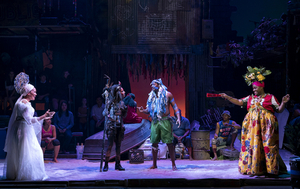Review: ONCE ON THIS ISLAND shines at Ordway Center For The Performing Arts

Once On This Island, playing at the Ordway Theatre through February 9th, is an exhilarating musical fable that seeks to transport the audience into the world of Haitian folklore through a story of love, resilience and sacrifice. This 2018 Tony Award winner for Best Revival of a Musical has a joyful, exuberant score written by powerhouse duo Lynn Ahrens and Stephen Flaherty that uses Caribbean music as its foundation.
Storytellers tell a young child frightened by thunder the tale of Ti Moune, a girl orphaned after a hurricane in the French Antilles. Ti Moune is taken in by the dark-skinned peasant couple Tonton Julian and Mama Euralie, and as she grows into young adulthood, she begins to yearn for love and a different kind of life. When a handsome stranger suffers injuries from a car crash, Ti Moune nurses him back to health and falls in love with the unconscious man, Daniel Beauxhommes.
The four Loa spirits in the show (Erzulie, goddess of love; Asaka, goddess of Earth; Agwe, god of water; and Papa Ge, demon of death) devise a test for Ti Moune - is love stronger than death? Ti Moune makes a deal with Papa Ge to sacrifice her life for Daniel's, and as he recovers from his near-death experience, Ti Moune and Daniel begin a love affair. They are the classic case of star-crossed lovers, as Daniel is from the caste of upper-class, light-skinned grand hommes and should not be associating with someone on Ti Moune's lower level. But love is love, and it is only when they are seen together at a ball that Ti Moune's naïve happiness is shattered. She learns that Daniel is already betrothed to a girl from the "right" side of the tracks, and is heartbroken that he will not throw aside his duty for their love.
Papa Ge gives Ti Moune the option to take back her decision and let Daniel die as originally intended. Although Ti Moune knows she will never have happiness with Daniel, she chooses to keep her vow and sacrifices her life for his. The gods reward Ti Moune for her selfless act by turning her into a tree that will shelter all the inhabitants of the island, regardless of class or color.
Director Michael Arden wanted to honor the culture, tradition and beliefs of the Haitian people in this show, and the design and execution of this production demonstrate that clearly. From set design to costumes to even the use of "trashtruments" (musical instruments made from found objects, created by John Bertles of Bash the Trash), this show gives the audience glimpses of a world suffering the devastation of hurricanes and other natural disasters while simultaneously finding hope and meaning through storytelling and faith. The set has a storm-ravaged quality, with corrugated tin, rusted semi-trailer trucks and tarps held together with tape and a prayer. Costumes help to clearly delineate the class structure, and the lighting is precise yet playful, shifting when each of the four gods is onstage, from a blue cast when Agwe, god of water is present to a dark, red hue when Papa Ge is roaming the stage.
The touring cast features some performers from the original Broadway cast, including the original Tonton Julian (played by Phillip Boykin), as well as a group of young actors that you can tell are enjoying every second of being onstage. From the onset, the small cast of 20 mingles with the on-stage audience before starting the performance, bringing you into the world of the show. The ensemble spends a majority of their time onstage, taking on multiple roles, which takes great focus and stamina to remain fully present. Kyle Ramar Freeman as Asaka is particularly wonderful - his take on the showstopper "Mama Will Provide" is a raucous delight that brought the house down. Cassondra James as Erzulie has a lovely interpretation of the song "The Human Heart", and also plays flute during "Some Girls". Choreographer Camille A. Brown infuses hope and a feeling of release in each dance step, and while the dancing is intricate and precise, you can feel every actor's joy as they move to the music.
The overall takeaway from Once on This Island is that love does conquer all. Whether it be romantic love, familial love, or the love of your people and your culture, when you move through the world with love in your heart, you affect and effect everyone you come in contact with. How you choose to share your love can help to change the world. There is no stronger message than that.
Photo Credit: Joan Marcus
Reader Reviews


